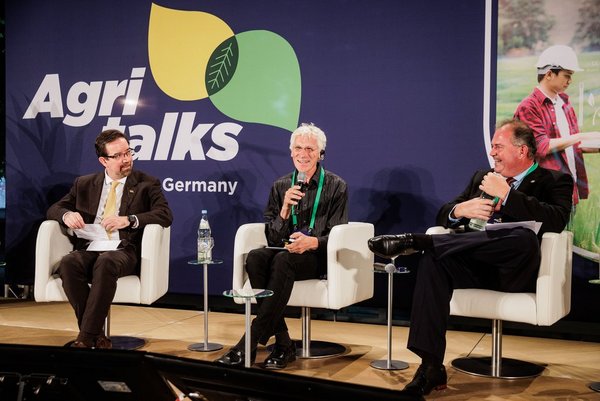- Share this article
- Subscribe to our newsletter
How can Brazil’s agriculture become more sustainable?
Since last September’s United Nations Food Systems Summit at the latest, the international community has been in agreement that our agricultural and food systems are not resilient enough to face the growing number of mutually aggravating crises. How the productivity of agriculture can successfully be raised against the background of an increasing world population while simultaneously conserving the natural resources and protecting the climate was discussed by representatives from politics, business and science at the “AgriTalks” in late May. The event was organised by the Brazilian agency for promoting trade and investment, ApexBrasil, and the Brazilian Embassy in Berlin.
Brazil is feeding a tenth of the world population
Brazil’s agribusiness sector is providing food for around 800 million people, or roughly a tenth of the world’s population. Alone such a dimension suggested that this country had a special responsibility to achieve the Sustainable Development Goals, Brazil’s Ambassador to Germany, Roberto Jaguaribe, said, opening the event, and added that it was ideally prepared for this. After all, with its 8.5 million square kilometres, over the past 50 years, the world’s fifth largest country had transformed itself from a net food importer to a net exporter which was now supplying produce to nearly 200 countries. And this was despite the fact that not even 30 per cent of its area was farmed on – 8 per cent for crops and 21 per cent for cattle farming. In the period referred to, agricultural production was raised by 385 per cent – with land dedicated to agriculture increasing by merely 32 per cent.
In addition to excellent natural conditions allowing two to three harvests a year as well as an extremely dynamic agricultural sector shaped by entrepreneurship, this was above all thanks to the implementation of scientific insights and the employment of modern technologies. This had enabled a successful enhancement of soil fertility and hence area productivity as well as a reduction of greenhouse gas emissions from agriculture.
Heading for zero emissions
Brazil has set itself the goal of achieving a net zero CO2 economy by 2040. Last year, 37 million hectares of soy was grown. As a legume, soy fixates nitrogen in the soil via its rhizobiae. By not using chemical fertilisers, CO2 emissions were cut by around 200 million tonnes, reported the President of the Brazilian agricultural research society Embrapa, Celso Moretti. In cooperation with the food corporation Nestlé, carbon-neutral milk was being produced, and carbon-neutral beef was already on the market. Methane emissions from the animals are compensated by planting trees.
Using adapted varieties was a further important pillar on the way to sustainable agriculture. A wheat variety developed at Embrapa which is adapted to tropical climate conditions has already been cultivated in Central Brazil since 2012, enabling a doubling of land under wheat cultivation without having to clear-cut areas. “Brains, not tractors are the symbol of Brazilian agriculture,” Moretti said.
Soil conservation through no-tillage farming
For a long time, soil erosion was regarded as a systemic problem of Brazilian agriculture. Even today, around 90 million hectares of pasture are regarded as degraded. Fernando Schwanke of the Inter-American Institute for Cooperation on Agriculture (IICA) referred to no tillage farming as a “revolution in the battle against soil degradation in crop farming”. This cultivation method was introduced in Brazil in 1972 by the German Herbert Bartz, who had brought it along from the USA. What started off with an area of 180 hectares has now grown to 35 million hectares in Brazil. Whereas in conventional sowing, up to 30 tonnes of soil can be lost per hectare each planting year, according to Schwanke, in direct seed or no tillage farming, this figure was reduced to a mere 2.2 tonnes per hectare and year. “In all, this is 1,022 billion tonnes of soil which does not go lost,” Schwanke calculated. In addition, this technology consumed less diesel, while soils were protected thanks to less employment of agricultural machinery.
The private sector is called upon
Brazil is an important partner in German development cooperation. Lisa Kirfel-Rühle of the German Federal Ministry for Economic Cooperation and Development welcomed the innovative Forest Law which Brazil had adopted in 2012, but also conceded that reducing deforestation represented a considerable challenge for a country like Brazil. In addition to government initiatives such as the European Union’s supply chain law, corresponding private sector initiatives were important. For example, the Brazilian company JBS – the world’s largest meat producer – is, according to JBS Director of Sustainability, Liège Vergili Correia, committed to achieve net zero in 2040. One aspect here is changes in animal feed. In addition, this enterprise, with a total staff of 250,000, has set itself the goal of its beef cattle supply being free of illegal deforestation in the Amazon and the other Brazilian biomes by 2025. Supplier monitoring ensured that suppliers were blocked who did not comply with regulations, Correira said.
(sri)





Add a comment
Be the First to Comment